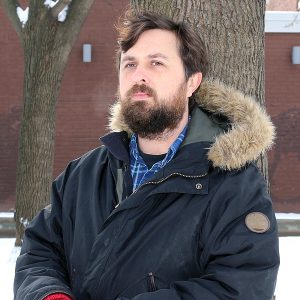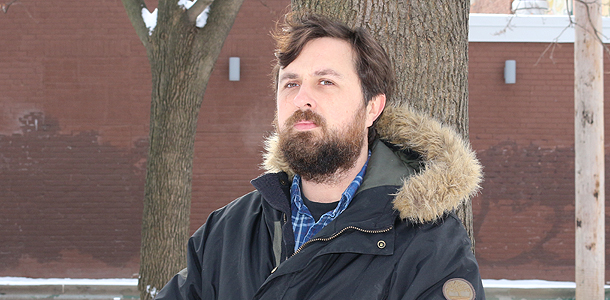
YOUTH REVISITED: Nathaniel G. Moore takes a trip down
memory lane in his new novel, set in Leaside.
Nathaniel G. Moore, with toque on inside the Common cafe at Bloor and Dovercourt, is talking about his step-daughter’s cat, a rescue and how the feline doesn’t adhere to the family’s schedule.
The cat is not yet domesticated, or at least not on the same clock as Moore, but it seems to exemplify the very crux of his novel, Savage 1986-2011, printed in 2013 by Vancouver-based publisher Anvil Press.
In this his third novel Moore explores the nuclear family dynamic during the early ’90s, and uses a large portion of his own formative years in Leaside as the basis.
He lived on Glenvale Avenue, and attended Northlea Public School and Leaside High School.
During his teenage years, he identified with professional wrestler Randy (Macho Man) Savage.
“The idea with the title Savage, beyond Randy Savage — and the literal meaning of the word is ‘undomesticated’ — is that it’s almost a domestic mystery,” he says, leaning forward, cupping his hand, and picking away at the skin under his knuckles.
“Who is the true savage in the novel, and to a degree we’re all the hero and the villain. We all make up this sitcom-slash-tragedy that is the modern family.”
He ignores any suggestion by critics that his novel is a “nostalgic romp” through his old neighbourhood.
But Moore doesn’t imply all his memories are better left in the vault.
“You can choose your friends, but you can’t choose who you are related to, but that’s the negotiation of life,” he says. “You lose friends just as much as you lose family members.
“It’s like a business you’re born into. The business bankrupts and you start another Fortune 500 company.”
Starting a new business, or rather family, is what Moore is doing now. The 39-year-old is engaged (to Amber McMillan), and will be the step-father to a 5-year-old daughter.
He admits he’s estranged from his parents, but evades questions intended to elicit details on the standing he has with his family.
“There have been pockets of interaction, but…” He pauses briefly, then continues. “We are estranged and we have acknowledged that.
“I’m not going to say there’s bad blood, but we have our own modern lives.”
Moore uses plenty of pop culture references when discussing family and life in the “suburb-like” Leaside. He says he didn’t have a lot of friends while attending Leaside High School, but the one beacon that stood with him was the Macho Man.
“He was always with me a mascot of my depression … I was really alone as a teenager.”
But wrestling was never meant to be context of the story, one which falls into the same vein as Moore’s contemporaries’ work: “fiction that is clearly autobiographical.”
“Having the wrestling thing run as a psychological subtext rather than ‘And now here’s a chapter from some imagined thing by Randy Savage’ — I never wanted to do that.”
Moore has since moved away from Leaside, living in the Bloor and Ossington area of Toronto, and reveals finishing the book, one that was swept under the rug during the publication of his second novel Wrongbar, has been cathartic.
“There’s a huge amount of anonymity in writing this book,” he explains. “It’s about a specific Leaside experience — mine — one
that no one else shared.
“It’s not about winning the football game and making out with 10 cheerleaders. It’s about one person’s life with their family.”

